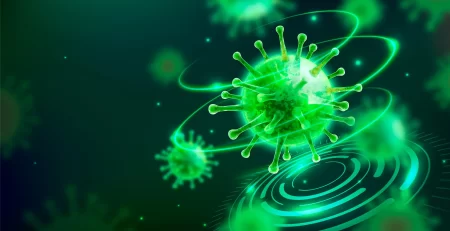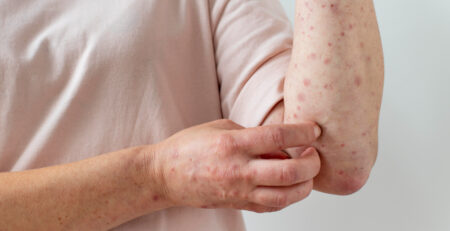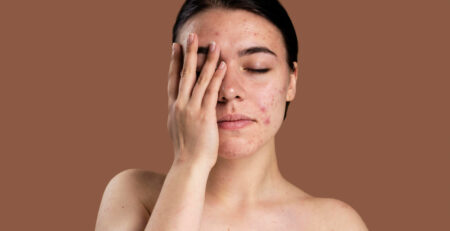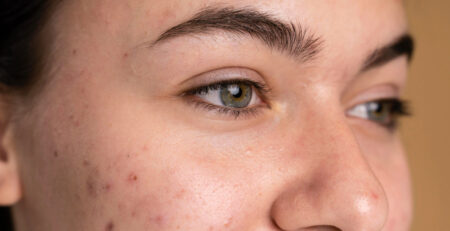Chickenpox
What is chickenpox?
Chickenpox, also called varicella, is a disease that causes red blisters all over the body that are itchy. This disease is caused by a virus. It happens to kids a lot, and it used to be so common that it was seen as a rite of passage.
Rarely does a person get chickenpox more than once. Since the chickenpox vaccine came out in the mid-1990s, the number of cases has gone down.
What are the symptoms of chickenpox?
The most common sign of chickenpox is a rash that is red and itchy. Before the rash and other symptoms show up, the infection will have to be in your body for about seven to twenty-one days. Up to 48 hours before the rash appears, you can spread the disease to other people.
Symptoms that don’t involve a rash may last a few days and include:
- fever
- headache
- loss of appetite
After you have these symptoms for a day or two, the classic rash will start to show up. Before the rash goes away, it goes through three stages. These things are:
- All over your body, you get red or pink bumps.
- The bumps turn into blisters that leak fluid.
- The bumps get crusty and then start to heal.
Not all of your bumps will be in the same stage at the same time. During your infection, new bumps will keep popping up. Before the rash turns into a scab and crust, it may be very itchy.
You are still contagious until all of your blisters have turned into scabs. The crusty, sore parts of the skin will eventually fall off. It will be gone for good in seven to fourteen days.
What causes chickenpox?
The Varicella-Zoster virus (VZV) is what causes chickenpox. Most cases happen when someone comes in contact with someone who has it. Before your blisters show up, the virus is contagious for one to two days. VZV is still contagious until all of the blisters have formed a hard crust. The virus can get around by:
- saliva
- coughing
- sneezing
- contact with fluid from the blisters
Who is at risk of developing the chicken pox?
The risk is lower for people who have been exposed to the virus through active infection or vaccination. A mother can give her child immunity to the virus by the way she cares for her. About three months after birth, the immunity lasts.
The virus can spread to anyone who hasn’t had it before. If any of these things happen, the risk goes up:
- You recently came in contact with someone who is sick.
- You’re younger than 12 years old.
- You are a grown-up who lives with kids.
- You have been to a school or a place where kids are cared for.
- Your immune system is weaker because you are sick or taking medicine.
How is chickenpox diagnosed?
If you get a rash that you can’t explain, you should always call your doctor, especially if you also have cold symptoms or a fever. You could have one of a number of viruses or infections. If you are pregnant and have had chickenpox, you should talk to your doctor right away.
Your doctor might be able to tell you or your child has chickenpox by looking at the blisters on your or your child’s body. Or, lab tests can find out why the blisters are there.
What are possible complications of chickenpox?
Immediately call your doctor if:
- Your eyes start to itch.
- It’s very red, itchy, and warm (signs of a secondary bacterial infection).
- The rash makes people feel dizziness or short of breath.
When problems arise, they most often involve:
- infants
- older adults
- people with weak immune systems
- pregnant women
These groups may also contract VZV pneumonia or bacterial infections of the skin, joints, or bones.
Women exposed during pregnancy may bear children with birth defects, including:
- poor growth
- small head size
- eye problems
- intellectual disabilities
How is chickenpox treated?
Most people who get chickenpox will be told to deal with their symptoms while the virus goes through their bodies. To stop the virus from spreading, parents will be told to keep their kids out of school and day care. Adults who are sick will also have to stay at home.
You can get antihistamines or topical ointments from your doctor or buy them over the counter if you want to stop itching. You can also make itchy skin feel better by:
- taking lukewarm baths
- applying unscented lotion
- wearing lightweight, soft clothing
Your doctor may give you antiviral drugs if the virus makes you sick or if it could make you sick in other ways. Most of the time, young people, older adults, and people with health problems are at high risk. The chickenpox can’t be cured by these antiviral drugs. By slowing down the way the virus works, they make the symptoms less bad. Your immune system will be able to heal faster.
What is the long-term outlook?
Most cases of chickenpox can be taken care of by the body on its own. Most people get back to their normal lives within one to two weeks after being diagnosed.
Most people can’t get chicken pox again after they’ve had it. VZV usually stays dormant in the body of a healthy person, so it won’t start up again. It can sometimes come back and cause another round of chickenpox.
shingles, which is a separate disease also caused by VZV, tends to happen later in adulthood. VZV can cause shingles to come back if a person’s immune system is temporarily weakened. Most of the time, this is caused by old age or a serious illness.
How can chickenpox be prevented?
If you get the two doses of the chickenpox vaccine, 98 percent of people will not get chickenpox. When your child is between 12 and 15 months old, they should get the shot. Between the ages of 4 and 6, children get a boost.
Adults and older children who haven’t been vaccinated or who haven’t been exposed to the disease may get extra doses of the vaccine. Since chickenpox is usually worse in older people, those who haven’t been vaccinated yet may decide to do so later.
People who can’t get the vaccine can try to avoid getting the virus by staying away from people who have it. But this isn’t always easy. The blisters of chickenpox can’t be used to tell if someone has it until the disease has been going around for days.











Leave a Reply